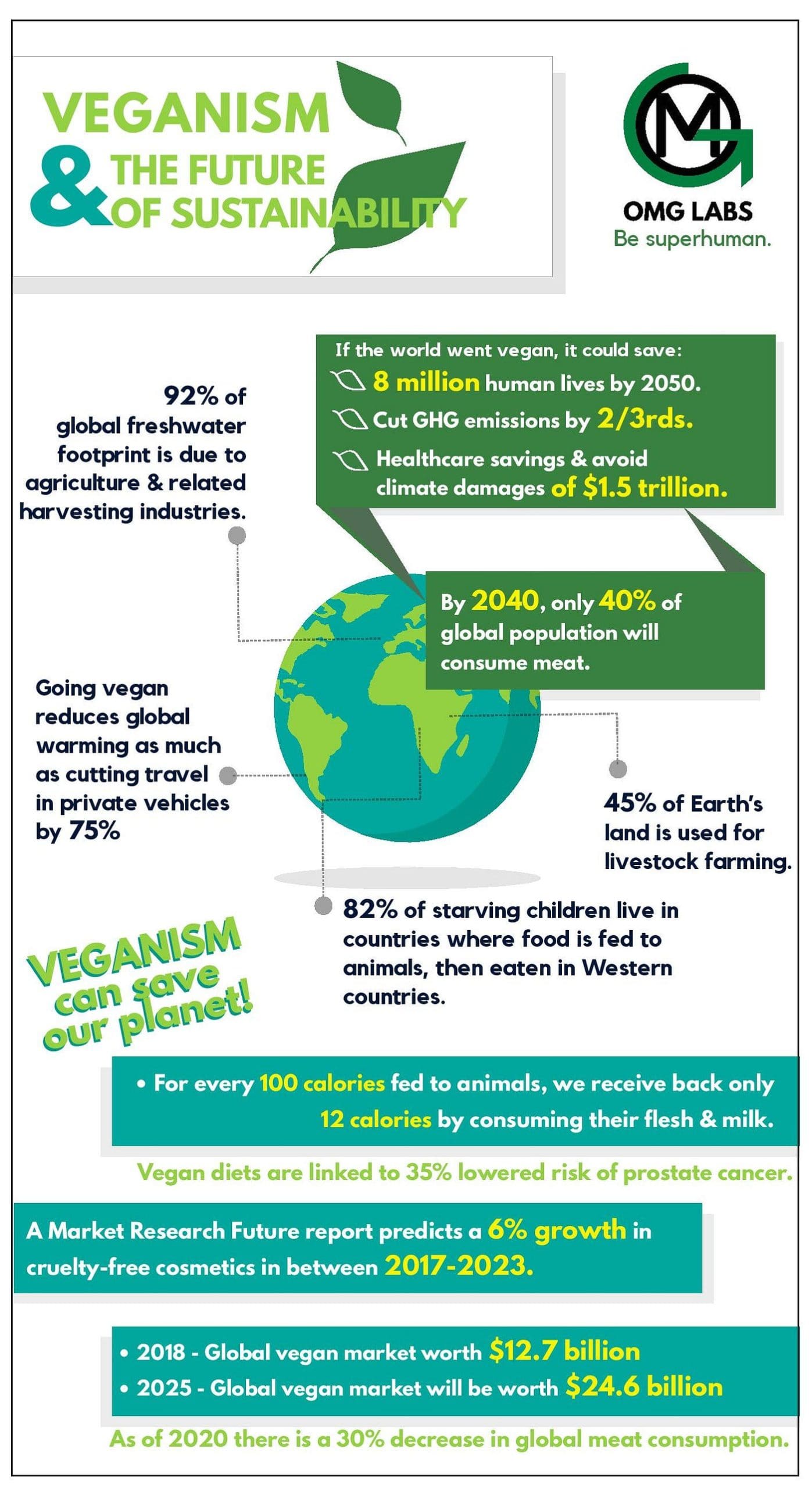Å leve et levende og sunt liv er noe vi alle streber etter, og en måte å oppnå det på er ved å ta i bruk et vegansk kosthold. Ikke bare gagner det vårt eget velvære, men det har også en positiv innvirkning på planeten. I dette innlegget vil vi utforske de mange fordelene med en vegansk livsstil, fra forbedrede helseresultater til miljømessig bærekraft. La oss dykke inn i veganismens verden og oppdage hvordan det kan føre til lang levetid og generell velvære.
Fordeler med en vegansk livsstil
Det er mange fordeler ved å ta i bruk en vegansk livsstil, ikke bare for helsen din, men også for planeten.

- Forbedret generell helse: Økt forbruk av frukt og grønnsaker kan føre til forbedret generell helse og velvære.
- Redusert risiko for hjertesykdom: Veganske dietter er vanligvis lavere i mettet fett og kolesterol, noe som reduserer risikoen for hjertesykdom.
- Lavere forekomst av fedme: Plantebaserte dietter har vært knyttet til lavere forekomst av fedme og lavere blodtrykksnivåer.
- Miljømessig bærekraft: Å velge en vegansk livsstil kan bidra til å redusere karbonavtrykket og bidra til et mer bærekraftig miljø.
Næringsrik vegansk mat
Vegansk kosthold kan gi store mengder essensielle næringsstoffer som fiber, vitaminer og mineraler. Her er noen næringsrike veganske matvarer du kan inkludere i kostholdet ditt:
1. Plantebasert protein:
- Belgvekster (bønner, linser, kikerter)
- Nøtter og frø (mandler, chiafrø, linfrø)
- Tofu og tempeh
2. Fullkorn:
- Quinoa
- brun ris
- Havre
3. Frukt og grønnsaker:
- Bladgrønt (spinat, grønnkål)
- Bær (blåbær, jordbær)
- Sitrusfrukter (appelsiner, sitroner)
4. Sunt fett:
- Avokado
- Kokosolje
- Oliven
Å inkludere disse næringsrike veganske matvarene i måltidene dine kan støtte generell helse og velvære samtidig som det gir viktige næringsstoffer for optimal funksjon av kroppen din.
Effekten av vegansk kosthold på helse
Studier har vist at vegansk kosthold kan redusere risikoen for å utvikle kroniske sykdommer som diabetes og kreft.
Redusert inntak av bearbeidet mat og animalske produkter kan føre til bedre vektkontroll.
Vegansk kosthold har vært assosiert med forbedret blodsukkerkontroll og redusert betennelse.
Et plantebasert kosthold kan støtte et sunt tarmmikrobiom og forbedre den generelle immunfunksjonen.
Tips for en vellykket overgang til veganisme
Overgang til en vegansk livsstil kan være en givende reise mot bedre helse og velvære. Her er noen tips for å hjelpe deg med en vellykket overgang:
1. Gradvis overgang
Start med gradvis å inkludere flere plantebaserte måltider i kostholdet ditt. Dette vil tillate smaksløkene og fordøyelsessystemet å tilpasse seg endringen jevnt.
2. Utdanne deg selv
Ta deg tid til å utdanne deg selv om vegansk ernæring for å sikre at du oppfyller kroppens behov for essensielle næringsstoffer som protein, jern og B12. Vurder å konsultere en ernæringsfysiolog for personlig råd.
3. Utforsk nye oppskrifter
Eksperimenter med nye veganske oppskrifter og matlagingsmetoder for å holde måltidene dine interessante og smakfulle. Det er mange ressurser tilgjengelig på nettet for kreative og deilige plantebaserte retter.
4. Koble til fellesskapet
Bli med i lokale eller nettbaserte veganske samfunn for støtte, råd og oppskriftsideer. Å omgi deg med likesinnede kan hjelpe deg med å holde deg motivert og inspirert på din veganske reise.
Husk at overgangen til en vegansk livsstil er et personlig valg, og det er greit å ta det ett skritt av gangen. Lytt til kroppen din, hold deg informert og nyt fordelene ved et medfølende og plantebasert kosthold.
Vegansk måltidsplanlegging og oppskrifter
Måltidsplanlegging kan bidra til å sikre at du får et balansert og variert vegansk kosthold. Her er noen tips og ideer for å inkludere deilige plantebaserte måltider i rutinen din:
1. Eksperimenter med forskjellige plantebaserte proteiner
- Prøv å inkludere tofu, tempeh, seitan eller belgfrukter som linser og kikerter i måltidene dine for protein og tekstur.
2. Utforsk internasjonale retter
- Oppdag veganske retter fra hele verden som indiske karriretter, meksikansk taco eller Midtøsten-falafel for kulinarisk inspirasjon.
3. Lager opp veganske stifter
- Hold pantryet ditt fylt med bønner, quinoa, brun ris, nøtter, frø og en rekke krydder for å lage smakfulle og næringsrike måltider.
Ved å inkorporere en rekke plantebaserte proteiner, utforske ulike retter og ha viktige veganske råvarer for hånden, kan du lage deilige og tilfredsstillende måltider som støtter din helse og velvære. God matlaging!
Sosiale og miljømessige fordeler ved veganisme
Å velge en vegansk livsstil kan ha vidtrekkende sosiale og miljømessige fordeler som strekker seg utover personlig helse. Ved å velge plantebasert mat kan enkeltpersoner bidra til en mer bærekraftig fremtid for planeten og ha en positiv innvirkning på globale matsystemer.
Miljøpåvirkning
- Veganske dietter har et lavere karbonavtrykk sammenlignet med dietter med høyt innhold av animalske produkter, ettersom produksjon av plantebasert mat krever mindre land, vann og ressurser.
- Å redusere avhengigheten av dyrelandbruk kan bidra til å redusere avskoging, vannforurensning og klimagassutslipp knyttet til husdyrhold.
- Å ta i bruk et vegansk kosthold kan støtte bevaring av biologisk mangfold ved å redusere habitatødeleggelse for husdyrbeite.
Samfunnsansvar
- Å velge plantebasert mat kan fremme etisk forbruk og redusere etterspørselen etter fabrikkdrevne dyr, og dermed støtte dyrevelferdsinitiativer.
- Veganisme er på linje med prinsippene for sosial rettferdighet ved å gå inn for rettferdig tilgang til næringsrike matkilder og bærekraftig landbrukspraksis.
- Å omfavne en vegansk livsstil kan fremme en følelse av fellesskap og solidaritet blant likesinnede individer dedikert til å skape en mer medfølende verden.
















































